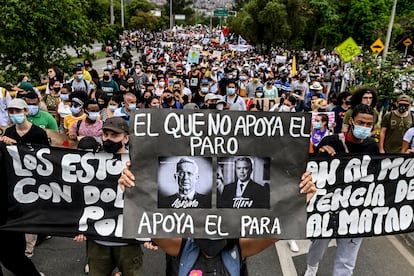A protest against the government of Iván Duque in Medellín, on April 28.JOAQUIN SARMIENTO / AFP
Few people know how to take advantage of political language as Álvaro Uribe Vélez does. The former Colombian president was the great international promoter of the “Castro-Chavism” concept, which over the years was exported to elections outside of his country, from Chile to the United States; or the so-called “gender ideology”, a concept invented by religious institutions that it used to oppose the peace process in 2016, as if the accords had posed a threat to the family and traditional gender roles. Two of several Manichean but politically very useful concepts that Uribe has exploited since his presidency, first and from his position as senator, later, (2002-2010) to polarize the political debate:They have served to encompass people and demonstrations who disagree with his ideas as enemies — a way of eliminating their nuances and giving them a name to create a threat — and those who support him as patriots who defend the nation from those enemies. To this powerful lexicon came, amid the protests of thousands of people against the government of Iván Duque, a new and strange example: that of the "dissipated molecular revolution."
"Resist Dissipated Molecular Revolution: prevents normality, scale and cup," he wrote on May 3 on Twitter, as a message in the form of a secret code. The country immediately began trying to decipher the cryptic concept. “Do you want to talk about molecular revolution or do you want to talk about national socialism?”, The promoter of the concept currently in Colombia, the Chilean Alexis López, asked defiantly in an interview with a Colombian radio station. Designated in Chile as a neo-Nazi in 2000, López is a far-right entomologist who does not speak of Pinochet as a dictator but as the man who prevented "us from falling into a totalitarian state of a socialist character." Author of articles such as
How many Soviets are there in Chile?
o
Students or violent people: aren't they the same?
It is not a voice that is taken seriously in the south of the continent.
More information
Internet disruption during protests inflames protesters in Colombia
In the trench of Puerto Resistencia, the insurgent bastion of Cali
Gabriel Gaspar, academic and expert on Defense issues in Chile, assures that "López is not a well-known person in the Defense community and, therefore, his work is not studied either." "He is not a professor at any of the academies and his antecedents link him to neo-Nazi circles," adds Gaspar, who was Undersecretary of War and the Armed Forces of the Chilean Ministry of Defense. When asked about López's dissipated molecular revolution theory that was cited by former President Uribe, he is categorical: "I don't even know it." In the Republican Party of José Antonio Kast, which is at the extreme right of the Chilean political arc, he assures EL PAÍS: “We have no formal or informal link with Mr. Alexis López. He is not a militant or has any relationship with the Republican Party ”.
However, López has been invited twice to lecture the Colombian military. "What we call the left is bigger than it usually wants to see," he told a group of military men at one of those two events. For López, citizen protests can be interpreted as disjointed urban guerrilla movements that fight "molecularly against the system to impose their own domination." Rather than taking power, they want to destabilize it, generate chaos, regardless of the "material realities" of the country. In a slide of his presentation, López makes a chronology of these movements that jump from the FARC and the ETA to the Zapatista Army or to the Spanish movement Podemos. A look that fits the Uribe ideology, where human rights defenders have been branded as guerrillas,and that it justifies the use of force against all protesters. The ties of the public force in Chile and Colombia are not unidirectional: in 2018, Colombian police officers trained the Comando Jungla en Chile, a squad of Carabineros accused of repressing Mapuche communities in Araucanía.
Perhaps the most interesting thing about the new ideologist is that López has said that his concept was not invented by him, but by French philosophers such as Jacques Derrida, Michel Foucault, Gilles Deleuze and the psychoanalyst Felix Guattari, the latter author of a book called
Molecular Revolution
(1977 ). When reading them, it is clear that perhaps there is no worse reader of French thinkers than that of the entomologist Alexis López.
"It is a very upset and distorted reading of what the molecular revolution implies for Guattari or for Deleuze," says Laura Quintana, professor of philosophy at the University of the Andes. “In reality, what Deleuze and Guattari captured is the way in which the powers oppress, which is related to the way in which those powers manage to capture our desire, and make our desire desire repression. What the molecular revolution indicates is that to change politically, to transform ourselves, we need to change how our desires are shaped, how our affects are shaped, how our bodies feel what they feel. This notion is linked to thinking that political change supposes a change in subjectivity ”.
Quintana explains that in reality these authors sought to combat Nazism and its drifts in Europe, trying to dismantle that internalized repression that systems such as capitalism can create. It was about transforming a very personal conscience rather than organizing an anarchy. "This is far from chaos and anomie," says Quintana. “And when the possibility of having a politics capable of embracing multiplicity is stigmatized, what that reveals is the fascist character of the one who stigmatizes. If they tell us that we cannot change the world we inhabit, that we should not embrace dissent, that we want docile bodies coupled with the social order, then that is very close to fascism ”.
But the bad readings of the French infiltrated the right-wing discourse in Colombia. López's ideas, for now, have been disseminated in opinion columns by a former Uribe adviser, a powerful Uribe senator, and even in an editorial by the College of Colonels of the National Police. The protests in Colombia are not "a social outbreak," says the editorial, but rather "it is a euphemism that has nothing to do with the legitimate demands of a society." A small sample of how far the speeches of the protesters and the public force are from each other today.
The dissipated molecular revolution will surely be disseminated not only this month but in the months to come, before the 2022 elections, as was the “Castro-Chavism” or “gender ideology” in the 2016 plebiscite. “Uribe has an intelligence great and knows how to move the rumor, and how the rumor has tremendous political effectiveness. When you put it around, people start to get suspicious and that creates effects, ”says Quintana.
But it is impossible for the dissipated molecular revolution to play in Iván Duque's favor at this time to achieve a dialogue with protesters this month. “The political class of this country lost control over the citizen demonstration,” says Sandra Borda, an internationalist professor and author of the book
Parar para Avanzar
, about the social protests that broke out at the end of 2019. “How did they exercise that control before? In the context of the armed conflict, they said 'these people who are coming out to protest are linked to the guerrillas', and that fulfilled several objectives: to scare people and remove the problem of dealing with the demands of the protest, ”adds Borda.
Before the peace process, the strategy did make public opinion less critical of police abuses. But the dynamics changed in 2019, when protests like the current ones erupt and Uribe's right cannot play that card easily. “So what are they turning to? To the available political speeches that allow them to continue using that same tool. It is no longer 'democratic security against the guerrillas' but this transnational idea of supposed molecular terrorism. They are looking for arguments not to have to face citizen protest as a form of political participation, ”says Borda.
In these demonstrations, public opinion is clearly far from ignoring the murders and abuses of the public force as in the worst years of the armed conflict. According to a recent survey by Cifras y Conceptos, 74% of young people between 18 and 25 have an unfavorable image of the Government. The requests for a police reform, one of the protesters' flags, is a sign of the critical spirit that has been strengthened in these years. But on the side of Uribista opinion, however, despite the serious crisis that Colombia is going through, it is not clear that the discourse of the "dissipated molecular revolution" is going to enter the everyday lexicon of Colombians so easily.
"Thinking about the Trump phenomenon, it is good to ask
oneself
up to where these speeches are the center of the discussion or are they beginning to be in what are called
fringes
, as in the edge where people say: they went crazy", says Borda .
“I have the impression that Uribe's speech, which was the
mainstream
, is on the way to ceasing to be so.
To people everything seems so crazy that they listen to Nazi and say: seriously?
Subscribe here to the
EL PAÍS América
newsletter
and receive all the information keys on the region's current affairs


/cloudfront-eu-central-1.images.arcpublishing.com/prisa/YOIAB3IZVZENPLEXJ3PCP7HOI4.jpg)
/cloudfront-eu-central-1.images.arcpublishing.com/prisa/RYAE4R2YX5G7LGEJQ74SXZI47A.jpg)


/cloudfront-eu-central-1.images.arcpublishing.com/prisa/CDLMN2QW2RHKPMWXAHXMURZ2NA.jpeg)

/cloudfront-eu-central-1.images.arcpublishing.com/prisa/HXJJWNKRZ5D5NKZOZI3RD7WCMY.jpg)
